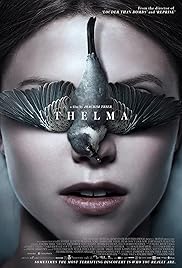 Directed by Joachim Trier / 2017
Directed by Joachim Trier / 2017
Thelma is a young woman who has left home to attend university. Her parents raised her in a strict household, but Thelma is now experiencing real independence for the first time in her life. Yet her parents still call nightly to check in on her, and they track which classes she’s supposed to be in online. She doesn’t drink, doesn’t smoke and she hasn’t had any real experience with true friendship. We’re meant to think this is all due to her parents’ fundamentalist religious beliefs, but there is something very wrong with Thelma.
There is nothing at all wrong with Thelma, the movie. Directed by Joachim Trier (Louder Than Bombs), Thelma is a supernatural thriller from Norway. It’s not a flashy film, and doesn’t contain a surfeit of jump scares (no one in this movie seems to own a cat). Its growing horror unfolds over the course of its runtime. We gradually become aware of Thelma’s situation, and the danger she presents to others close to her.
During her first week away from home, Thelma meets another young woman, Anja (Kaya Wilkens). Thelma’s initial interest in friendship soon blossoms into physical infatuation. Animals begin to behave in unusual ways. Birds repeatedly fling themselves against windows, snakes and insects slither up from underground. When Anja returns Thelma’s attention, the crush of conflicting emotions such as love, lust, and guilt overwhelm Thelma. They threaten to unleash whatever dark power she possesses. Concerned over her episodes, which manifest themselves physically as non-epileptic seizures, Thelma undergoes a battery of medical tests. The doctors can find nothing wrong with her physically- perhaps her condition is entirely mental.

For all its supernatural shenanigans, Thelma plays out more as a quiet character study than as a Nordic remake of Carrie. Eili Harboe’s performance as the eponymous young woman depicts her as equal parts naive, confused and dangerous. Yet it’s a performance as quiet and restrained as the film surrounding it. As Thelma learns more about who she is as a person- what she likes, whom she loves- the more of her power she unlocks. The dawning realization of what she is capable of frightens Thelma. It frightens her more than it does her parents, who know firsthand the kind of thoughtless devastation Thelma can inflict.
Her father’s emotions trap him between his love for his daughter and his terror at what she could become. Trond (Henrick Rafaelsen) cannot let Thelma go to become her own woman, nor can he end the danger she poses once and for all. He can only rely on half-measures such as religion or drugs for control, neither of which offer a satisfying solution.

Entrapment is a major theme in Thelma. Thelma’s mother (Ellen Dorrit Petersen) is in the same emotional trap as Trond. Yet, she more clearly sees the need for more desperate solutions. Thelma feels guilt and remorse over her feelings for Anja, and she desires to fit in with her peers at school. Those feelings become a trap for her; if she acts on them, she could lose control. Throughout the film, we observe Thelma through glass- like a specimen at a reptile house,or the fish she sees trapped beneath the ice. One character, revealed late in the film, is trapped by another through a heavy regimen of drugs, another is trapped beneath… well I can’t say any more about that. Even the more free-spirited Anja is trapped by forces she does not perceive and cannot begin to understand.
The ending of Thelma raises a good many questions, questions which I can’t really discuss in detail here for fear of spoilers. You might leave the theater thinking that the hero has defeated the villain and the hero has won; but who really is the villain of the movie? It’s to the movie’s credit that there isn’t an easy answer to that question. To even ask it is to miss the point. Thelma isn’t about heroes and villains. It’s about the ways people get themselves trapped in harmful relationships. It’s also about a young woman who has freaky mental powers.


